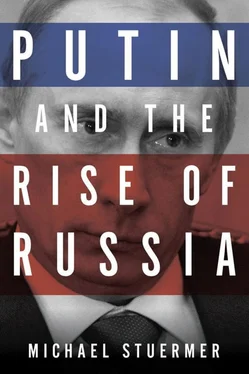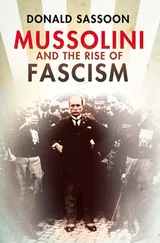There is, though, one overriding leitmotif expressed time and again. If, as Putin told Time magazine in early December 2007, ‘one country starts to dictate an agenda in international affairs, this will not meet with understanding but rather resistance’. There was no need to name the United States of America, which was in for a few lessons in diplomacy: ‘Today’s world requires that we use other methods and instruments to communicate with one another, and other ways to fight against today’s threats…. We need to negotiate and find compromises. The ability to compromise is not just a diplomatic formality you reach with a partner. Rather it is respect for their legitimate interests.’
The containment of North Korea and its nuclear installations, effected after long negotiations around a six-pointed table with China in the chair, US and Russia co-chairing, Japan and South Korea footing the bill, is cited as an instance of successful crisis management and a model for future collaboration. Unrequited admiration for the sole surviving superpower is what lurks behind most Russian protestations.
Chess being the favourite national pastime, the layout of Russian strategy today, tomorrow and far into the future can be compared to the careful, risk-averse combinations an experienced player is contemplating, always watchful of his opponent’s movements, expecting the worst. The backdrop, however, is a philosophy of old-fashioned power politics. The ideologically saturated rules of Cold War times have mostly been relegated to the archives. Fundamentally, a country’s foreign policy is shaped by forces beyond the control of politicians: climate, size, resources, population, neighbours – the Kremlin after the Cold War being no exception. Russia today, leaving aside the vast expanse of the Russian landmass, is more of a normal country than it was throughout the Soviet period, the foreign policies of the Kremlin – using the Foreign Ministry as a subservient institution – driven by immediate needs, short-term combinations and personal preferences. But there are certain ground rules for the formulation of the foreign policy agenda, defined by the domestic power structure as much as by the long-term idea of how to shape what the Kremlin likes to call the ‘near abroad’, relations with major powers like the United States and the PRC, and power – blocs like the European Union.
New era of confrontation?
The nearest thing to a theory to come out of Moscow in recent months was published by Sergei Karaganov, not a new name in the Kremlin’s corridors of power, in fact a former adviser to Yeltsin and, in more recent years, to Putin. Karaganov also figures as the Director of the Europe Institute of the Academy of Sciences and dean at the State University for Economics in Moscow. He would not publish something completely objectionable to the Kremlin. In fact his ideas fit in very well with what the world has seen in recent months, especially since Putin voiced his anger at the Munich Security Conference in February 2007. In Moscow Karaganov is respected as an authority on the West in general, the US and the bilateral security equation in particular. What he wrote in a Russian periodical that is being published under his supervision and, in an abbreviated version, in the International Herald Tribune in May 2007 sounded like the theoretical underpinning three months after that Munich outburst.
Was Karaganov’s message directed at the Americans, or the Europeans? Publishing it in the op-ed pages of the International Herald Tribune would have been strange if it was directed exclusively at the Europeans. Perhaps the message to the Europeans contained another, hidden message to the Americans: if you don’t play with us, we can play with the Europeans, one by one or all together, just as conveniently. And if you play hardball, the Europeans will get nervous, and we will be nice to them, and you will be the odd man out. The Romans referred to this kind of approach as divide et impera – divide and rule.
Karaganov, for starters, wondered why the state of Russian-EU relations was so poor. ‘Misunderstandings and detail,’ he mused, ‘push aside major matters of common interest.’ Was it not vital to prevent the wider dissemination of weapons of mass destruction together, or at a minimum contain their proliferation? Or take the fight against terror ‘which, after the inevitable American retreat from Iraq will be even worse and indeed mushroom’? Last but not least it was paramount to deal with Islamic extremism – the Russians think of Chechnya and millions of Muslims throughout their southern provinces: to deactivate, to block, or to fight.
After that introduction to world affairs Karaganov came to the hard core of commonality: ‘There is, on top of everything else, a common though unspoken concern, and that is the management of the United States of America. The objective must be to persuade this important country to give up its ruinous unilateralism and return to a policy of effective leadership in a multilateral framework.’ The Europeans should side with Moscow for the purpose of reminding the US of the rules of the game – and of the limits of power. Of course, a seasoned Kremlin adviser tends to understand very well, especially after the Chirac-Schröder imbroglio with the US over Iraq, that the Europeans, if they side with Moscow, would fall apart between pro-American and anti-American tendencies and, before long, paralyse each other. In a multipolar world Russia would be the main beneficiary. Oil, gas, pipelines and, in the foreseeable future, liquefied natural gas are strong arguments for a historic compromise.
Energy is seen as the main strength of Russia, and also the main weakness of Europe. Russia as a supplier, Karaganov argued, is interested in moderately high prices, while the Europeans want moderately low prices: ‘This conflict could have been solved if both sides had a common, overriding strategy.’ That means not only a long-term predictable and equitable price – Putin quoted USD 50 in September 2006. For Russia it means above all downstream participation in distribution networks, for the Europeans co-ownership and partial control of Russian production. This, Karaganov concluded, had been the hard core of what Putin had offered, but the Europeans refused and, instead, accused Russia of energy imperialism. The oil offer was followed by the long list of Russian grievances, from the EU’s support for Ukraine’s Orange revolution in 2004 – indeed for the Kremlin leaders a traumatic experience – to its sympathy with the national independence of Moldova, Georgia and Azerbaijan, and on to the removal of the bronze Red Army soldier from the centre of Tallinn to the outskirts of the Estonian capital.
Those are the ‘misunderstandings and details’ that were irritating for Karaganov and the Kremlin. Meanwhile, he came back to grand strategy concerns: Russia and Europe are united in the secular decline of their position in the world at large. Russia has to cope with the rise of China and of militant Islam, while Europe’s international standing is suffering ‘due to the incompetence of the small states’. In military matters and in energy policy Europe, Karaganov insisted, does not count for much.
What follows from all of this? The long-term advice from the Kremlin is unequivocal: ‘A Russia-EU alliance may not conform to today’s political correctness. But it offers so many advantages to both sides that it will surely be back, one day, on the table.’ The Atlantic Alliance? Karaganov would have no regrets over its demise. Russia would win where the Soviet Union lost: the Great Game for Europe’s future.
Soon after, in a more substantial paper Karaganov talked of what he termed the NEC: ‘the New Era of Confrontation’. It sounded like a position paper for the Kremlin’s master and was in fact a variation upon the theme Putin had pronounced in Munich in early February, but couched in more academic language and in systematic order. A long list of the West’s sins was produced, with the US again in the dock. Meanwhile, the Europeans, after the departure of Germany’s Schröder and France’s Chirac, were not granted attenuating circumstances. In fact from NATO enlargement towards Eastern Europe to Ukraine’s Orange revolution of 2004, from the US anti-missile project in the Czech Republic and Poland to the unilateral sponsorship of Kosovo’s separation from Serbia – hardly an item irritating the Russians was left out.
Читать дальше











